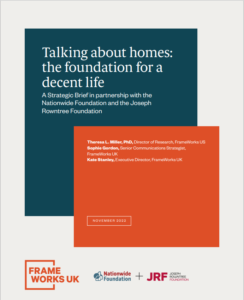
Natalie Tate
Project Lead for Talking About Housing
Natalie leads the partnership on this joint project between the Nationwide Foundation, the Joseph Rowntree Foundation and FrameWorks UK.
A new framing strategy for homes is available to help campaigners and communicators make the most of their voice when talking to the public. It helps tell a story that shifts thinking away from housing as a consumer good, towards seeing homes as essential to a decent life.
Do you work in the housing sector and yet sometimes struggle to find the right words to explain why decent and affordable homes are so important to our opportunities in life? Or perhaps you feel people hear you, but you know they still think that the existing housing problems are insurmountable? Do people too often fall back on a preoccupation with house prices, investments and attitudes to savings?
People in the UK recognise the housing crisis; even if they’re not experiencing the lack of decent affordable homes themselves, many people know someone who is, and can see how their lives are impacted for the worse by this on a daily basis.
Yet in the UK, housing is primarily seen as the best way to build wealth. We lament that there is a dire lack of affordable homes and we’re aware that this is causing harm; but at the same time many people still see property as an investment rather than a home.
Persuading people that everyone can and should have a decent, affordable home means shifting this dominant public narrative away from wealth acquisition. Instead it needs to move people to thinking immediately and primarily about homes as benefitting our mental and physical health, providing a safe and secure foundation that we all need.
One of the big challenges we face is that although people see there’s unequal access to homes and that poor quality exists, they don’t know how these problems have come about and therefore they can’t picture how, or even if, they could be fixed.
This is where the need for effective framing comes in. The Nationwide Foundation and the Joseph Rowntree Foundation have worked in partnership with FrameWorks to discover the best ways to frame communications about homes, in a way that diminishes fatalism, builds understanding and activates a ‘can-do’ attitude. By using the right language, we can help people to believe that change is possible and worth calling for.

Together, we’ll shortly be launching a toolkit that offers guidance to anyone who writes and talks about homes. In summary, the five recommendations are:
- Talk about homes as a source of health and wellbeing to build understanding of why access to decent and affordable homes matters. By leading with health and wellbeing we remind people why this matters and what’s at stake. Using the link between our homes and our mental health is just as effective as talking about physical health impacts.
- Use the ‘foundation’ metaphor to show how decent, affordable homes should be an essential priority. We can use metaphors to offer our brains a strong immediate mental image. The research identified that describing decent, affordable homes as the ‘foundation’ for people’s lives is an effective way to build understanding.
- Invoke people’s sense of moral responsibility to build the case for making decent and affordable housing available to everyone. This builds a sense of collective obligation and when paired with a systemic solution, we can steer thinking away from individualism or fatalism.
- Combine a critical tone with explanations of systemic solutions to build a sense of urgency and efficacy. We should call the housing crisis the crisis it really is. We should also focus in on a specific part of the issue and explain which housing policies can address these problems, what they involve, and be clear how they will help.
- Put individual stories in context to bring systemic changes to the housing system to life. We should put individuals’ stories into context by clearly pointing to how poor policies or a lack of action have negatively affected people and how positive policies have – or could have – a beneficial impact. This approach will help bring to life the systemic changes for housing that are needed.
If framed well, using these five evidence-led principles to communicate about homes will activate a shift in mindsets, whether that’s when talking to your friends and family, or in your work as you create content that engages the public in your campaigns.
You can read the full Talking about Housing and Homes report online. To support the strategy and offer hands-on support, hints, tips and examples, a Talking about Housing and Homes framing toolkit will be launched at the end of February 2023. There is also an online webinar taking place on 28 February which you can join to hear about the findings.
